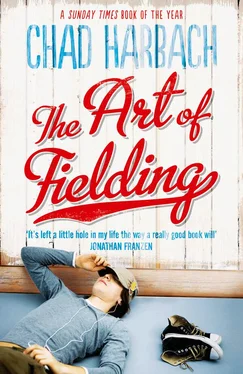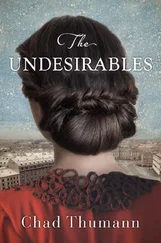“Not to me.” His dad blew his nose on his napkin, leaving the usual dark streak of steel-dust snot. “I’m sure Westish College needs all the money it can scrape together. They’ll stick a hundred gullible suckers on the baseball team, as long as they pay their tuition.”
This was the dark thought Henry had been working hard to suppress: that it was too good to be true. He steadied himself with a sip of milk. “But why would Schwartz care about that?”
Jim Skrimshander grunted. “Why does anybody care about anything?”
“Love,” Sophie said. “He loves Henry. They talk on the phone all day long, like lovebirds.”
“Close, Soph.” Their dad pushed back his chair and carried his plate to the sink. “Money. I’m sure Mike Schwartz gets his cut. A thousand bucks a sucker.”
Later that night, Henry relayed the gist of this conversation to Schwartz. “Bah,” said Schwartz. “Don’t sweat it. He’ll come around.”
“You don’t know my dad.”
“He’ll come around.”
When Henry didn’t hear from Schwartz all weekend, he began to feel glum and foolish about having gotten his hopes up. But on Monday night, his dad came home and put his uneaten bag lunch back in the fridge.
“Are you feeling okay, hon?” asked Henry’s mom.
“I went out for lunch.”
“How nice,” she said. Henry had visited his dad on his lunch hour many times through the years: regardless of the weather, the guys sat outside on the benches that faced the road, backs to the shop, munching their sandwiches. “With the guys?”
“With Mike Schwartz.”
Henry looked at Sophie — sometimes, when he found himself unable to speak, Sophie did it for him. Her eyes were as wide as his. “Well well!” she said. “Tell us more!”
“He dropped by the shop around lunchtime. Took me to Murdock’s.”
Flabbergasted was maybe not a strong or strange enough word to describe how Henry felt. Schwartz lived in Chicago, Chicago was five hundred miles away, and he’d dropped by the shop? And taken Henry’s dad to Murdock’s? And then driven back, without so much as telling Henry he’d done it, much less stopping by to say hello?
“He’s a very serious young man,” his dad was saying.
“Serious as in, Henry can go to Westish? Or serious as in, Henry can’t go to Westish?”
“Henry can do whatever he wants. Nobody’s stopping him from going to Westish or anywhere else. My only concern —”
“Yeay!” Sophie reached across the table and high-fived her brother. “College!”
“— is that he understands what he’s in for. Westish is not your average school. The academics are tough, and the baseball team is a full-time commitment. If Henry’s going to succeed there . . .”
. . . and Henry’s dad, who so rarely strung four words together, especially on a Monday night, went on to talk for the rest of the meal about sacrifice, passion, desire, attention to detail, the need to strive like a champion every day. He was talking just like Mike Schwartz, but he seemed not quite to realize it, and in fact he also sounded a good deal like himself, only in many more words, and with, Henry thought, a slightly more generous attitude toward his son’s talents than usual. As his dad stood up to carry his plate to the sink, he clapped Henry on the shoulder and smiled broadly. “I’m proud of you, buddy. This is a big opportunity. Grab on to it.”
It’s a miracle, Henry thought. Mike Schwartz works miracles. After that, he continued to talk to Schwartz on the phone every night, making plans, working out details — but now he did so openly, in the family room, and his dad hovered nearby, the TV on mute, cigarette going, eavesdropping and shouting out comments. Sometimes Schwartz would ask to talk to Jim. Henry would hand his dad the phone, and his dad would sit down at his desk and go over the Skrimshanders’ tax returns.
“Thanks,” Henry said into the phone, feeling sentimental, on the day he bought his bus ticket. “Thank you.”
“Don’t sweat it, Skrim,” Schwartz said. “It’s football season, and I’m going to be busy. You settle in. I’ll be in touch, okay?”
“PHTJMBER 405,” said the smiling woman. She thrust a key and a paper map into his hand, pointed to the left. “Small Quad.”
Henry slipped through a cool aperture between two buildings and emerged on a bright, bustling scene. This wasn’t Lankton CC: this was college in a movie. The buildings matched — each four or five stories high and made of squat gray weather-beaten stone, with deep-set windows and peaked, gabled roofs. The bike racks and benches were freshly painted navy. Two tall guys in shorts and flip-flops staggered toward an open doorway beneath the weight of a gigantic flat-screen TV. A squirrel tore down out of a tree and bumped against the leg of the guy walking backward — he screamed and dropped to his knees, and the corner of the TV sank into the plush new sod. The other guy laughed. The squirrel was long gone. From an upper window somewhere drifted the sound of a violin.
Henry found Phumber Hall and climbed the stairs to the top floor. The door marked 405 stood slightly ajar, and bleepy, bloopy music came through the gap. Henry lingered nervously in the stairwell. He didn’t know how many roommates he’d have, or what sort of roommates they might be, or what kind of music that was. If he’d been able to imagine the students of Westish College in any specific way, he imagined twelve hundred Mike Schwartzes, huge and mythic and grave, and twelve hundred women of the sort Mike Schwartz might date: leggy, stunning, well versed in ancient history. The whole thing, really, was too intimidating to think about. He nudged the door with his foot.
The room contained two identical steel-frame beds and two sets of identical blond-wood desks, chairs, dressers, and bookshelves. One of the beds was neatly made, with a plush seafoam-green comforter and a wealth of fluffy pillows. The other mattress was bare but for an ugly ocher stain in roughly the size and shape of a person. Both bookshelves had already been neatly filled, the books arranged by author name from Achebe through Tocqueville, with the rest of the Ts through Z piled on the mantel. Henry plunked his bags down on the ocher stain and drew his beat-up copy of Aparicio Rodriguez’s The Art of Fielding out of his shorts’ pocket. The Art was the only book he’d brought with him, the only book Henry knew deeply: suddenly it seemed like this might be a terrible flaw. He prepared to wedge it between Rochefoucauld and Roethke, but lo and behold there was already a copy there, a handsome hardcover with a once-cracked spine. Henry slid it out, turned it in his hands. Inscribed on the flyleaf, in a lovely calligraphic hand, were the words Owen Dunne.
Henry had been reading Aparicio on the overnight bus. Or at least he’d kept the book open on his lap as the dreary slabs of interstate rolled by. By this point in his life, reading Aparicio no longer really qualified as reading, because he had the book more or less memorized. He could flip to a chapter, any chapter, and the shapes of the short, numbered paragraphs were enough to trigger his memory. His lips murmured the words as his eyes, unfocused, scanned the page:
26. The shortstop is a source of stillness at the center of the defense. He projects this stillness and his teammates respond.
59. To field a ground ball must be considered a generous act and an act of comprehension. One moves not against the ball but with it. Bad fielders stab at the ball like an enemy. This is antagonism. The true fielder lets the path of the ball become his own path, thereby comprehending the ball and dissipating the self, which is the source of all suffering and poor defense.
147. Throw with the legs.
Читать дальше










